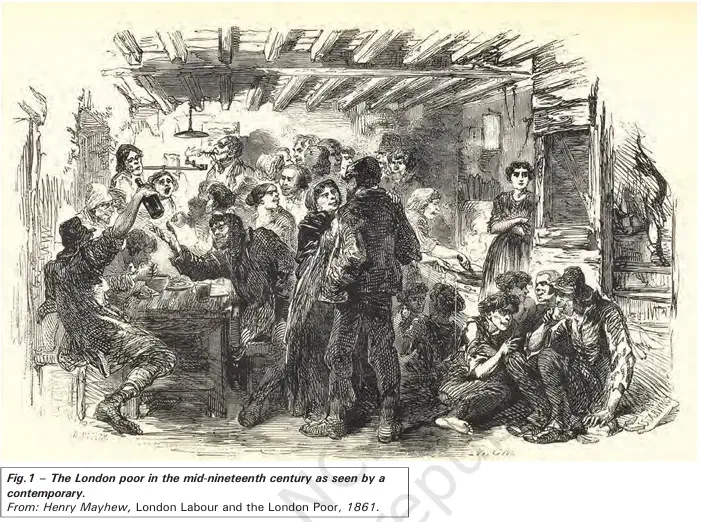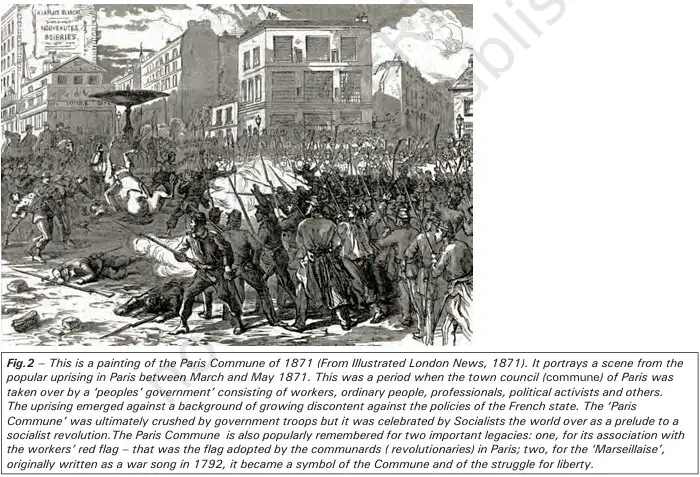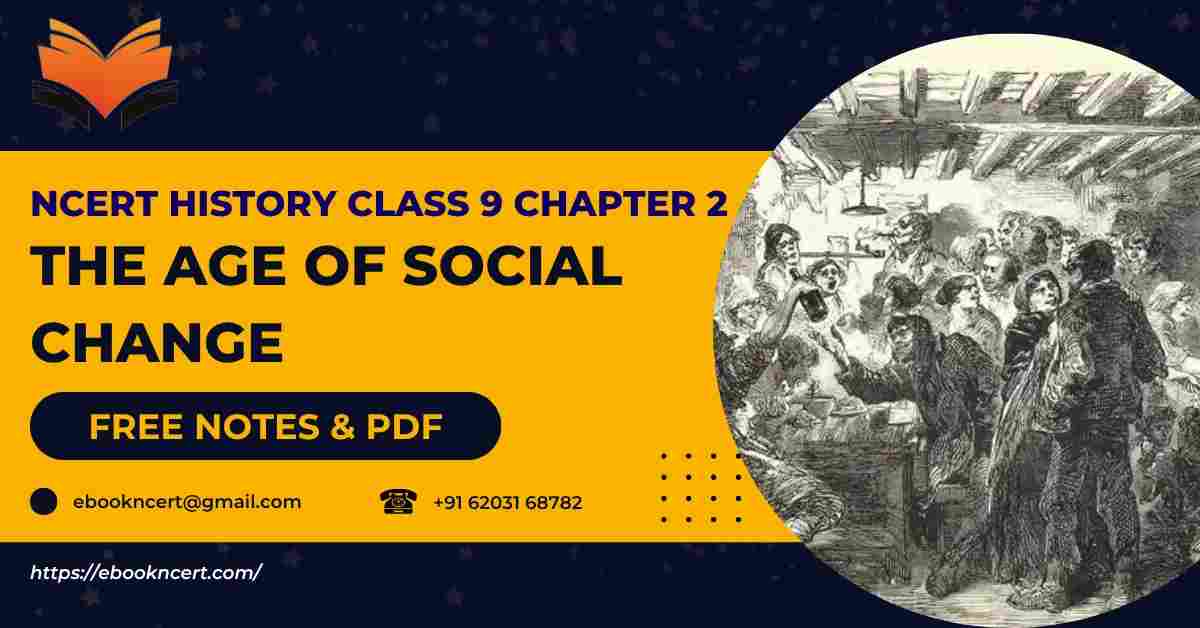The Age of Social Change – Concept & Notes PDF
Topic & sub-topics covered: The Age of Social Change and MCQs Questions: Socialism in Europe and the Russian Revolution (All single detail notes are exam-oriented).
We have discussed in-depth and exam-oriented pointers that can be asked in the board exam of class 9th about the “The Age of Social Change” from the NCERT History notes for class 9th chapter 2nd “Socialism in Europe and the Russian Revolution“.
Download the NCERT History for Class 9th Chapter 2 Socialism in Europe and the Russian Revolution Notes PDF
Looking for clear, concise NCERT notes on Chapter 2: Socialism in Europe and the Russian Revolution? Download the NCERT History Class 9 Chapter 2 Notes PDF and make your revision easier. These notes break down key events, important terms, and timeline-based developments – from the rise of socialism in Europe to how the Russian Revolution changed global politics. Perfect for quick revision before exams, class tests, or just to understand the chapter better. Click to download the free PDF now and study smarter.
The Age of Social Change
1. Legacy of the French Revolution:
- The French Revolution spread powerful ideas of freedom and equality across Europe.
- It opened the possibility of radically restructuring society, which was previously divided into estates and orders.
- Before the 18th century, aristocracy and the Church controlled economic and social power in Europe.
- The revolution made people question who should hold power in society, shifting focus toward individual rights.
2. Global Influence of Revolutionary Ideas:
- Revolutionary ideas inspired debates on societal structure in other parts of the world, including Asia and India.
- In India, thinkers like:
Raja Rammohan Roy
Henry Louis Vivian Derozio: discussed the impact and significance of the French Revolution. - Developments in European colonies reshaped and reinterpreted these revolutionary ideas, especially around freedom and social justice.
3. Diverse Responses in Europe:
- Not everyone in Europe wanted a complete transformation of society.
- There were three major political ideologies with differing views on change:
- Conservatives: Favored gradual change and wanted to preserve traditional institutions.
- Liberals: Believed in individual rights and wanted constitutional reforms.
- Radicals: Wanted complete and rapid restructuring of society.
- The terms conservative, liberal, and radical had different meanings in different historical contexts.
4. Towards Socialism:
- The 19th century witnessed the rise of important political traditions that influenced change across Europe.
- Among these, socialism emerged as a key ideology advocating equality and collective ownership.
- The Russian Revolution was a significant historical event where an attempt was made to radically transform society.
- After the revolution, socialism became one of the most powerful and influential ideologies shaping the 20th century.
Liberals, Radicals and Conservatives
1. Liberals: Beliefs and Demands:
- Liberals were one of the political groups that wanted to change society in 19th-century Europe.
- They supported a nation that tolerated all religions, promoting religious equality.
- This was significant because at the time:
a. Britain favoured the Church of England.
b. Austria and Spain favoured the Catholic Church. - Liberals opposed the absolute power of dynastic rulers.
- They advocated for individual rights and limitations on government authority.
- Liberals wanted:
a. A representative, elected parliamentary government.
b. Laws to be interpreted by an independent, trained judiciary. - However, liberals were not in favour of democracy as we understand it today.
- They did not support universal adult franchise (voting rights for all adults).
- They believed that only men with property should be allowed to vote.
- Liberals also did not support voting rights for women.
2. Radicals: Beliefs and Demands:
- Radicals wanted a government based on the will of the majority.
- Many radicals supported the women’s suffrage movement (right to vote for women).
- Radicals opposed privileges enjoyed by:
a. Great landowners
b. Wealthy factory owners - While radicals accepted private property, they disapproved of its concentration in the hands of a few.
3. Conservatives: Beliefs and Attitude Towards Change:
- Conservatives opposed both liberal and radical ideas.
- In the 18th century, conservatives resisted all change.
- However, after the French Revolution, even conservatives began to accept that some change was necessary.
- By the 19th century, conservatives believed in:
a. Respecting the past
b. Bringing about slow and gradual change
4. Clashes and Transformations in 19th Century Europe:
- The differences among liberals, radicals, and conservatives led to clashes during periods of social and political upheaval.
- Revolutions and reform movements in the 19th century highlighted both the potential and limitations of these political ideologies.
5. One-liner Revision Facts:
- Liberals = religious tolerance + limited government + vote only for propertied men
- Radicals = majority rule + support for women’s vote + against privilege
- Conservatives = respect the past + gradual change
Industrial Society and Social Change

1. A Period of Great Social and Economic Change:
- The early 19th century marked a new era of social and economic transformation in Europe.
- This era witnessed:
a. The rise of new cities
b. Development of industrial regions
c. Expansion of railways
d. The Industrial Revolution
2. Impact of Industrialisation:
- Industrialisation brought men, women, and children into the factory system.
- Long working hours and poor wages were common.
- Unemployment was frequent, especially during times of low demand for goods.
- Rapid urban growth led to:
a. Housing shortages
b. Poor sanitation
3. Response of Liberals and Radicals:
- Liberals and radicals were concerned about these social issues and searched for solutions.
- Most industries were privately owned by individuals.
- Many liberals and radicals were property owners and industrialists themselves.
- They believed individual effort and enterprise should be encouraged for social progress.
- They strongly opposed the hereditary privileges of the aristocracy.
- Their belief: if individuals had freedom, the poor could work, and capitalists could invest freely, society would naturally progress.
- They advocated for:
a. A healthy workforce
b. Educated citizens
c. Freedom for capital and labour
4. Rise of Political Mobilisation:
- Many working-class men and women rallied behind liberal and radical parties demanding change.
5. Role of Nationalists, Liberals and Radicals in Revolutionary Activities:
- After 1815, many nationalists, liberals, and radicals wanted to overthrow monarchies established in Europe.
- These revolutionaries aimed to:
a. End autocratic rule
b. Create nations with equal rights for all citizens
6. Giuseppe Mazzini and His Influence:
- Giuseppe Mazzini, an Italian nationalist, became a key revolutionary figure after 1815.
- He worked to unify Italy and end monarchy through secret societies.
- Mazzini’s revolutionary ideas inspired nationalists in other countries, including India.
7. One-liner Revision:
- Industrialization = factories + long hours + poor wages + urban problems
- Liberals/radicals = pro-enterprise + against aristocracy + support educated workforce
- Post-1815 = revolutions to end monarchies
- Mazzini = nationalist hero, inspired others (including in India)
The Coming of Socialism to Europe
1. Origin and Spread of Socialist Ideas:
- Socialism emerged as a major ideology in Europe by the mid-19th century.
- It proposed a radical restructuring of society.
- Socialism attracted widespread attention due to increasing inequalities under capitalism.
2. Socialist Views on Private Property:
- Socialists were against private property, which they considered the root of all social evils.
- They believed property owners focused only on personal gain, neglecting the welfare of workers.
- They argued that if society as a whole controlled property, collective interests would be better served.
3. Alternative Visions of a Socialist Society:
- Different socialists had different ideas on how a socialist society should function.
- Some supported the cooperative model of production and distribution.
- Robert Owen, a British industrialist, tried to build a cooperative community in New Harmony, Indiana (USA).
4. Role of the Government in Socialism:
- Some socialists believed that cooperatives could not succeed without state support.
- Louis Blanc (France) advocated government-backed cooperatives to replace capitalist enterprises.
- These cooperatives were to:
a. Consist of people producing goods collectively
b. Share profits based on the work contributed by each member
5. Contribution of Karl Marx and Friedrich Engels:
- Karl Marx and Friedrich Engels further developed socialist ideas.
- Marx viewed industrial society as ‘capitalist’, where:
a. Capitalists owned factories
b. Workers generated profits, but didn’t benefit from them - Marx believed:
a. Capitalism must be overthrown
b. Workers must control property
c. A classless, communist society must replace capitalism - According to Marx, a communist society would:
a. Be free from exploitation
b. Ensure equal control of property
c. Be the inevitable future of industrial society
| Name | Country | Contribution |
|---|---|---|
| Robert Owen | England | Founded cooperative community in USA |
| Louis Blanc | France | Urged government to support cooperatives |
| Karl Marx & Friedrich Engels | Germany | Called for overthrow of capitalism & formation of communist society |
Support for Socialism

1. Spread and Coordination of Socialist Movements:
- By the 1870s, socialist ideas had spread across many parts of Europe.
- To coordinate socialist efforts globally, an international body called the Second International was formed.
2. Rise of Workers Associations:
- Workers in England and Germany began forming associations to improve:
a. Living conditions
b. Working hours
c. Right to vote - These associations also set up mutual aid funds to support members in times of need.
3. Political Role of Workers and Socialist Parties:
- In Germany, workers’ associations collaborated with the Social Democratic Party (SPD).
- SPD gained strength in parliamentary elections with the help of organized workers.
4. Rise of Socialist and Labour Parties in Europe:
- In 1905:
a. A Labour Party was formed in Britain.
b. A Socialist Party was established in France. - These parties gave a political platform to socialists and trade unionists.
5. Limitations of Socialist Success (till 1914):
- Until 1914, socialists never formed a government in any European country.
- Although they had parliamentary representation, the real power remained with:
a. Conservatives
b. Liberals
c. Radicals
| Country | Organization/Party | Key Feature |
|---|---|---|
| Germany | Social Democratic Party (SPD) | Supported by workers’ associations |
| Britain | Labour Party (formed in 1905) | Represented socialists and unions |
| France | Socialist Party (formed in 1905) | Represented working-class interests |
New words:
- Suffragette movement – A movement to give women the right to vote.
Next & Previous Topics of NCERT/CBSE History Class 9 Chapter 2: Socialism in Europe and the Russian Revolution
| Topics No. | Topics Name |
|---|---|
| 1 | The Age of Social Change |
| 2 | The Russian Revolution |
| 3 | The February Revolution in Petrograd |
| 4 | What Changed After October? |
| 5 | The Global Influence of the Russian Revolution and the USSR |
MCQs on NCERT History Class 9 Chapter 2 Topic – The Age of Social Change
Here are the top exam-oriented MCQ-type questions on “The Age of Social Change” that you should prepare for your CBSE or state board exams:
Question 1. What major ideas began circulating in Europe after the French Revolution?
a) Industrialisation and colonisation
b) Freedom and equality
c) Fascism and imperialism
d) Capitalism and slavery
Answer: b) Freedom and equality
Question 2. Who among the following Indian thinkers was influenced by the ideas of the French Revolution?
a) Gandhiji
b) Raja Rammohan Roy
c) Dadabhai Naoroji
d) Bhagat Singh
Answer: b) Raja Rammohan Roy
Question 3. How was European society structured before the 18th century?
a) Based on gender equality
b) Divided into castes
c) Based on estates and orders
d) Divided into urban and rural
Answer: c) Based on estates and orders
Question 4. What did post-revolutionary debates mainly focus on?
a) Expansion of colonies
b) Political instability
c) Individual rights and control of social power
d) Military expenditure
Answer: c) Individual rights and control of social power
Question 5. Which of the following beliefs did liberals support?
a) Government based on universal adult franchise
b) Equal rights for men and women
c) Tolerance of all religions
d) Rule of monarchy
Answer: c) Tolerance of all religions
Question 6. Which of these statements is true about liberals?
a) They supported women’s right to vote
b) They were against private property
c) They wanted elected parliamentary government
d) They supported complete monarchy
Answer: c) They wanted elected parliamentary government
Question 7. What was the view of liberals on the voting right?
a) Only the king should vote
b) All men and women should vote
c) Only men of property should vote
d) Only government officials should vote
Answer: c) Only men of property should vote
Question 8. Which group supported women’s suffrage and opposed the concentration of wealth?
a) Conservatives
b) Monarchists
c) Liberals
d) Radicals
Answer: d) Radicals
Question 9. What was the stance of conservatives in the 19th century regarding change?
a) Rejected all kinds of change
b) Accepted slow and respectful change
c) Wanted immediate revolution
d) Fully supported democracy
Answer: b) Accepted slow and respectful change
Question 10. Which political group in the 19th century wanted radical transformation of society?
a) Conservatives
b) Moderates
c) Radicals
d) Bureaucrats
Answer: c) Radicals
Question 11. What major change did industrialisation bring?
a) Only growth of agriculture
b) Decline of cities
c) Migration of people to factories
d) End of monarchy
Answer: c) Migration of people to factories
Question 12. What was a common problem during industrialisation?
a) Shortage of workers
b) High wages and leisure
c) Poor housing and sanitation
d) Increase in monarchy power
Answer: c) Poor housing and sanitation
Question 13. What did liberals and radicals believe about individual effort?
a) It should be ignored
b) It was irrelevant to development
c) It was the basis for social development
d) It should be discouraged
Answer: c) It was the basis for social development
Question 14. What did nationalists, liberals and radicals want after 1815?
a) Establishment of monarchy
b) Colonisation of Europe
c) Overthrow of existing monarchs
d) Expansion of church rule
Answer: c) Overthrow of existing monarchs
Question 15. Who inspired many nationalists with his revolutionary ideas in Italy?
a) Otto von Bismarck
b) Giuseppe Mazzini
c) Napoleon Bonaparte
d) Karl Marx
Answer: b) Giuseppe Mazzini
Question 16. What did socialists consider the root of all social ills?
a) Monarchy
b) Religion
c) Private property
d) Capital punishment
Answer: c) Private property
Question 17. What was Robert Owen’s contribution to socialism?
a) Started trade unions
b) Introduced universal franchise
c) Built a cooperative community called New Harmony
d) Wrote the Communist Manifesto
Answer: c) Built a cooperative community called New Harmony
Question 18. What was the name of the socialist thinker who promoted government-supported cooperatives in France?
a) Karl Marx
b) Friedrich Engels
c) Robert Owen
d) Louis Blanc
Answer: d) Louis Blanc
Question 19. What did Karl Marx advocate for?
a) Capitalist economy
b) Rule by aristocrats
c) Communist society
d) Divine rights of kings
Answer: c) Communist society
Question 20. According to Karl Marx, who produced capitalist profits?
a) Factory owners
b) Military leaders
c) Workers
d) Kings
Answer: c) Workers
Question 21. What was Karl Marx’s belief about the future?
a) Monarchs would rule forever
b) Workers would build a communist society
c) Capitalism would expand
d) Property would remain privately owned
Answer: b) Workers would build a communist society
Question 22. What was the Second International?
a) Trade union
b) Political party
c) Body to coordinate socialist activities
d) Capitalist organisation
Answer: c) Body to coordinate socialist activities
Question 23. What did workers in England and Germany demand in the 1870s?
a) Absolute monarchy
b) Increase in taxes
c) Reduction of working hours
d) Abolition of all property
Answer: c) Reduction of working hours
Question 24. When was the Labour Party formed in Britain?
a) 1875
b) 1890
c) 1905
d) 1917
Answer: c) 1905
Question 25. Which of the following parties did German workers support?
a) Labour Party
b) Congress Party
c) Socialist Democratic Party (SPD)
d) Liberal Democratic Party
Answer: c) Socialist Democratic Party (SPD)
Question 26. Till 1914, which type of governments continued to rule Europe despite socialist efforts?
a) Communist
b) Conservative, liberal, and radical
c) Military and dictatorships
d) Absolute monarchies
Answer: b) Conservative, liberal, and radical

